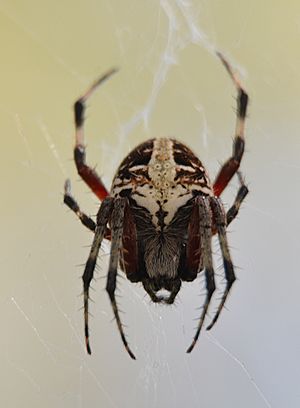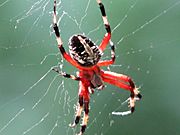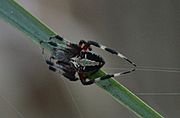Spotted orbweaver facts for kids
Quick facts for kids Spotted orbweaver |
|
|---|---|
 |
|
| Female at Fort Clinch State Park in Florida | |
| Scientific classification | |
| Genus: |
Neoscona
|
| Species: |
domiciliorum
|
| Synonyms | |
|
|
The spotted orbweaver, also known as the redfemured spotted orbweaver, is a type of spider. Its scientific name is Neoscona domiciliorum. This spider belongs to the Araneidae family.
The name domiciliorum comes from Latin. It means "of dwellings." This is because these spiders often live on buildings. Don't worry, their bites are not known to cause serious harm to people.
Contents
What Does the Spotted Orbweaver Look Like?
Adult spotted orbweavers have a special mark on their back. It is a bright white or yellow shape on their abdomen (the back part of their body). This mark often has wide black stripes on each side. There is also a thin white band near the front. This creates a pale cross shape.
The first part of each leg is red. The other parts of their legs have black and light gray bands. The underside of the spider is dark. It has four white spots on its abdomen. The very tip of the abdomen is red.
Female spiders are usually between 7 and 16 millimeters (about 0.3 to 0.6 inches) long. They have short gray hairs. Male spiders are smaller, about 8 millimeters (about 0.3 inches) long. They have a smaller, more slender abdomen.
Where Does the Spotted Orbweaver Live?
This spider is found only in the United States. It lives in the southeastern parts of the country. You can find them southeast of a line connecting Texas, Indiana, and Massachusetts.
They like to live in habitats with trees. They especially prefer moist woods with hardwood trees. In Florida, you can often find females in moist woodlands during the autumn. They also like to live on buildings. You might see them under the eaves (the part of the roof that hangs over). They are often hard to spot because they are usually active at night.
How Does the Spotted Orbweaver Build Its Web?
Spotted orbweavers build their webs vertically. They place them in trees, shrubs, or on buildings. These webs can be up to 50 centimeters (about 20 inches) wide. The long frame lines that hold the web can reach shrubs or even the ground.
The center of their web is open. Only one or two threads cross this central part. Female spiders build these webs. They often replace their webs. They build a new one at dusk and usually take it down before sunrise. Later in the season, the female might leave her web up during the day. This is probably because she needs more food when she is getting ready to lay eggs.
The spider also builds a small hiding spot. It uses leaves or bits of debris. It holds them together with silk. This retreat is usually near one end of a frame line. The spider uses this spot to hide during the day. At night, the spider usually stays in the center of its web. It is very alert to any movement or vibration.
Gallery
See also
 In Spanish: Neoscona domiciliorum para niños
In Spanish: Neoscona domiciliorum para niños



